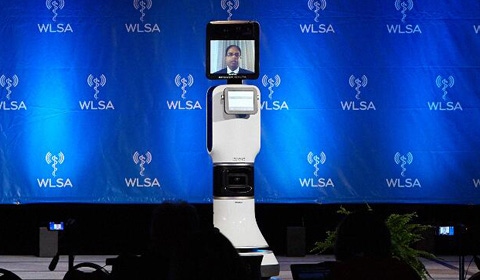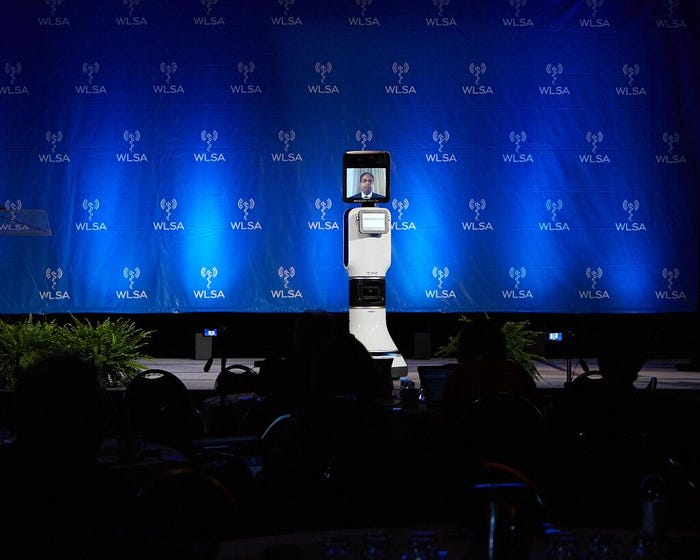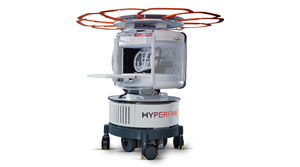FDA's Bakul Patel took the stage at WLSA Convergence Summit 2013 using an RP-VITA to speak with the audience on the status of FDA's mobile health application regulations. It was a gesture as symbolic as it was quasi-futuristic. Patel could have just as easily conferenced in using Skype or Facetime (but then again this is a health conference). Likewise, given the current stage of FDA's draft guidance on mobile medical apps, one has to wonder if there might be a more convenient way...or at least one that brings up fewer questions.
May 30, 2013

FDA's Bakul Patel took the stage at the WLSA Wireless Convergence Summit 2013 using an iRobot RP-VITA to speak with the audience on the status of FDA's mobile health application regulations. It was a gesture as symbolic as it was quasi-futuristic. Patel could have just as easily conferenced in using Skype or Facetime (but then again this is a health conference). Likewise, given the current stage of FDA's draft guidance on mobile medical apps, one has to wonder if there might be a more convenient way...or at least one that brings up fewer questions.
|
Patel on stage (via RP-VITA) at WLSA 2013. Image via Twitter |
Patel reasserted FDA's commitment to innovation and also quelled fears that the agency might overreach in its efforts to regulate mHealth. The big takeaway is that unless the app was created specifically with a medical purpose in mind, FDA has no desire to regulate it. For example, “Electronic textbooks or smartphones themselves are not medical devices,” Patel says. “A generic smartphone with no medical purpose is not a medical device, and FDA has no intention to regulate it.”
What FDA does intend to do is to focus on a small subset of apps – an effort Patel calls “regulating smartly” and scaling back. This includes apps that are patient self-management apps, simple tracking or trending apps not intended for treating or adjusting medication, apps that are used as an accessory to an already regulated medical device, and apps that transform a mobile device into a regulated medical device.
Patel commented on some triumphs FDA had made up to this point, such as determining that medical device data systems (MDDS) should be classified as Class I devices. But the sense was that real progress was still on the horizon. With no timeline or release date given for the draft guidance, the audience was still left with a good number questions.
How will FDA regulate claims and advertising made about apps? The challenge, Patel says, is, “Trying to clarify which claims are general health and wellness claims and which ones are disease or condition-related statements.” An app that claims it will make you lose 50 lbs, for example, is not so much an issue. However, Patel says FDA is “very concerned when products make a claim that gets to diagnosis or treating an illness or condition.” The line is that FDA doesn't want to concentrate on what it deems low-risk apps (i.e. one that claims weight loss over one that claims diagnosis or treatment of cancer).
And here's where things start to get tricky. An audience member asks: What of the App Store itself? If the Apple App Store starts selling FDA-regulated apps, shouldn't the App Store itself then be regulated as a device distributor or manufacturer? Per Patel, the word from FDA is, no. Apps intended for medical use will be regulated, but since the app store itself is not intended for medical purposes it will not be regulated. Essentially, your grocery store is not responsible for the quality of the milk you buy – the dairy farmer is.
And there were still more questions Patel unfortunately did not have time to answer. How will FDA regulate mobile apps sold overseas? What if an app doesn't meet approvals, but is distributed anyway? Will Class I, II, III be applied to apps?
While certain strides are certainly being made, it seems as if mHealth companies will have to wait for FDA's draft guidance before too many more concrete answers are given. Remote robots are certainly cool, but perhaps what mHealth companies need is a bit more directness and transparency from FDA very soon.
-Chris Wiltz, Associate Editor, MD+DI
Related Content
Guidance on Mobile Medical Apps Near
The Shift to Value-Added Mobile Apps
You May Also Like



